Feature
The Singing Detective: 25 years on
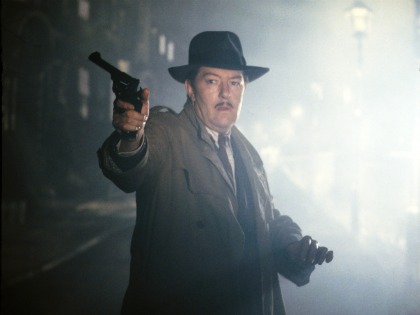
Is Dennis Potter’s singalong noir miniseries the all-time pinnacle of television drama? Graham Fuller thinks it is
Dennis Potter’s The Singing Detective, directed in six parts by Jon Amiel, first aired on BBC1 from 16 November to 21 December 1986. That means a quarter of a century has passed in which it has remain un-eclipsed as television’s Citizen Kane (in Stephen King’s estimation) and its Hamlet.
It would be exciting to report that the multilayered serial’s blending of genres, kaleidoscopic subjective perspective, explication of the roles of the Oedipus Complex and Original Sin in the creation of neurosis, and dynamic depiction of psychotherapy has a substantial legacy. But it’s not really the case. The beneficiaries have included Alain Resnais’s homage On Connait le chanson (The Same Old Song), The Sopranos, possibly David Lynch’s Mulholland Dr. and David Cronenberg’s Spider – the latter’s pre-adolescent protagonist’s re-casting of his angelic mother as a whore echoing the unconscious experience of The Singing Detective’s Philip Marlow (Michael Gambon). The main British descendant of The Singing Detective (and Potter’s Pennies From Heaven and Lipstick on Your Collar) is Peter Bowker’s serial Blackpool, but only in its use of lip-synched songs.
Potter’s masterpiece begins with an extended film noir visualisation of an episode in Marlow’s eponymous pulp novel. This is a sub-Chandlerian conspiracy thriller about a sleek, misogynistic British agent, Mark Binney (Patrick Malahide), deviously and lucratively involved in the post-war traffic in Nazi scientists, who sleeps with and abuses a Russian spy masquerading as a nightclub waitress. After she disappears, he is stalked by two trenchcoated agents and hires a wisecracking private eye/dance band singer (Gambon) to find the girl or otherwise prove he didn’t kill her.
Influenced by American pulps, and atmospherically by the first part of Hitchcock’s The 39 Steps, the story is being re-written in his head by the hospitalised Marlow – a misanthropic recluse whose joints are wracked with arthritis and whose skin is covered in flaking lesions – to stop himself going mad. Memories, paranoid imaginings, and hallucinations gang up on him as he lies in bed.
Unable to control his temperature, he hallucinates songs in sublimation of his desires – the angelic Nurse Mills (Joanne Whalley) who greases Marlow’s psoriatic penis suddenly materialises as the glamorous chanteuse Carlotta (’Blues in the Night’) – or as a manifestation of his anxieties, as when the hospital doctors react to his quest for emotional help by suggesting different medications (’Dry Bones’). His alter ego, the gumshoe, croons along to ‘Cruising Down the River’ and ‘The Teddy Bear’s Picnic’, rendering them sinister. Several times Marlow causes the corpses of naked women to be fished out of the Thames; when the nine-year-old Philip (Lyndon Davies) went down to the woods one day back in 1945 he saw his mother (Alison Steadman) having sex in the bracken with his father’s friend, Raymond Binney (Malahide).
This spectacle, comparable to an act of sexual abuse, induced Philip to regress and secretly defecate on the desk of his hectoring teacher (Janet Henfrey). Recalled by Marlow in hospital, Raymond and Mrs. Marlow’s orgasmic sex is intercut with the fatal heart attack of Marlow’s neighbouring patient George – an old soldier whose tale of buying sex with cigarettes from frightened girls in bombed Hamburg elicits Marlow’s moral fury – reinforcing the long-established sex-death connection in Marlow’s mind. The guilt he feels for not alerting doctors to George’s plight seconds earlier echoes the guilt he felt for his assumed culpability in bringing about the institutionalisation of Raymond’s backward son and his own mother’s suicide.
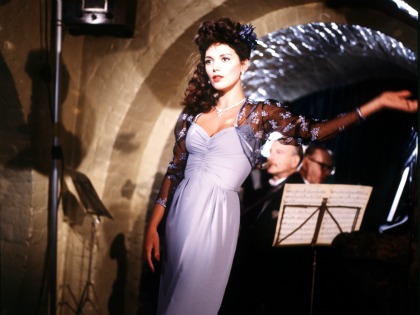
As the noir-novel strand dwindles in the narrative weave, Marlow begins a paranoid fantasy, in which he gives his estranged wife Nicola (Janet Suzman) an imaginary lover, Mark Finney (Malahide), the ghost of the real and fictional Binneys, and the adulterous pair steal his Singing Detective screenplay. This ‘theft’ is the reluctant analysand’s unconscious attempt to conceal the story, with all its psychological clues to his illness, from himself and his psychotherapist Dr. Gibbon (Bill Paterson), who uncovers Marlow’s sexual revulsion via a lurid description of copulation in his pulp story (it originally appeared in Potter’s abstrusely self-reflexive roman à clef Hide and Seek), and his repressed associations between the words ‘woman’, ‘fuck’, ‘dirt’ and ‘death’. In keeping with Freud’s notion that the fear of dirt was linked to infantile experiences of pleasure that have to be regulated, Philip – having spied on his mother’s sin – began to equate sex not only with death (after his mother died) but also with filth, hence his addiction to prostitutes (’unclean’ women). Helping Marlow to deconstruct these brutalising assumptions, Gibbon sets him on the road to recovery by showing him that he laid down all the Freudian clues to the source of his illness in his novel, as if he had wanted them to be discovered.
Potter once recalled an occasion or occasions when his father saw him writing. As Potter sat at his desk, the old Forest of Dean miner, apparently hesitating on the threshold of the room, wished his son well. Potter had come to regret that he had not invited his father to come in; instead he had carried on working. The evocation of filial disregard was indelibly cinematic and brutally universal – which of us who has lost a parent isn’t haunted by recollections of such heedlessness? Autobiographical particulars inform much of Potter’s work – a version of his father in Stand Up, Nigel Barton rages at Nigel for betraying the Forest of Dean community, as Potter believed he had done in his 1960 documentary Between Two Rivers. He was at pains to deny that The Singing Detective was autobiographical, but it was typically infused with details from his life – hence Philip’s exile to Hammersmith at the end of the war, Marlow’s suffering psychosomatic psoriatic arthropathy, his obsession with prostitutes, his love-hate attitude to women.
Resonating with Potter’s memory of taking his real father for granted, one of the most powerful moments comes when Marlow, dreaming or hallucinating, learns that his father is long gone. His guilt is revealed in the scene in which Marlow, clad in his hospital pyjamas, projects himself into the village working’s club 40 years earlier, where he fondly watches his doleful dad (Jim Carter) whistling ‘Birdsong at Eventide’ on stage. When Marlow tries to clap him, he can’t because of his arthritically clenched fists.
A local man berates him for having never having given “the poor bugger credit when him was alive! Got too big for thee boots, disn’t?” Looking around the suddenly desolate, cobwebbed room, Marlow cannot believe that his father is dead. “There’s so much I want to say… Come over here! Dad! Thee’s know how much I’d care about tha-” But it’s too late for him to atone for the apparent disdain he showed his father in the years following his mother’s death. The scene pre-echoes Marlow’s recollection of the moment when Philip, having returned to the village after she committed suicide, snubs his father’s affection and runs away. Only the father’s “animal-like cry of absolute grief and despair” brings Philip back to his side. Their reconciliation on the forest path, however momentary, is crucial to Marlow’s eventual healing.
The time-slippage – the greasy pyjamas, the hands that won’t clap, the anguish of the lesioned Marlow sitting where he sat as a boy – pulls the viewer out of the merged past and present tenses of The Singing Detective and makes you question exactly what it is you are watching. As disorienting as the songs that the characters orbiting around Marlow lip-synch in his disease-stoked reveries, it’s a customised version of a Brechtian alienation effect intended to break through the audience’s dreamlike-state of passive subjective identification with Marlow and make it work to understand how and why, as a spiteful, embittered 50-year-old, he travels back to his lost childhood Eden.
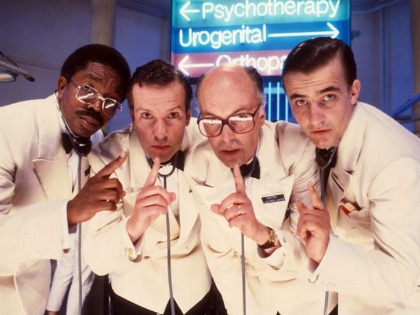
Looked at today, after nearly 30 years of increasingly slick and anodyne all-film drama on television, The Singing Detective inevitably seems dated, but no more so than such contemporaneous movies as Videodrome and Blue Velvet. The rock-concert lighting and oblique camera angles that capture Marlow reeling mid-hallucination and the staging of the songs (which merge the different strands and invade the naturalistic hospital scenes) were hangovers from television’s electronic studio heyday in which Potter cut his teeth and which was dear to him for its capacity to reach a mass audience with a fresh visual lexicon.
Yet such pop-expressionistic stylisation fulfilled Potter’s brief. As an homage to the studio plays that had enabled him to experiment with non-naturalistic grammar between 1965 and 1978, he had hoped that the hospital scenes would be taped in the studio – videotape then affording a greater illusion of intimacy than 16mm film. Amiel persuaded him that 16mm was essential, but little was lost in translation. Frequent closeups of the hospitalised Marlow drifting into reveries, followed by cuts to the noir detective story or childhood memories, and the discreet use of quickly-cut montages, were sufficient to establish the stream-of-consciousness commingling of past and present. Once in that space, it was impossible not to empathise with this “one sick fellow from way back when”, as his mid-Atlantic-accented alter ego calls him, for all his rancour, self-pity, and sexual disgust.
Simultaneously, the series was a consummation and a culmination, the symbolic end of an era that had revolutionised British television drama, liberating it from upper-class, proscenium-arch complacency endemic to the dominant mode of naturalistic televised theatre. Non-naturalism had been polemicised by Troy Kennedy Martin in ‘Nats Go Home’, his manifesto, published in Encore in spring 1964, for a new form of television drama that broke with the insistence on “subjective identification with characters” and sought “to free the camera from photographing dialogue, to free the structure from natural time and to exploit the total and absolute objectivity of the television camera.” The onus, Kennedy Martin argued, should be on capturing interior thought.
As Potter, who applauded the article, said in 1992, “Naturalism assumes that the world out there is as it is, and I know that not to be the case – and most people know it. If they really examine themselves they know that their own feelings, their aspirations, moods, memories, regrets and hopes, are so tangled up with the alleged reality of the out-there, that the out-there is actually interpenetrated by feelings. Naturalism can easily lead to the assumption that you are created by the out-there and by all the imperatives of the world. Non-naturalism and its use of the inside of your head is more likely to remind you about the shreds of your own sovereignty.”
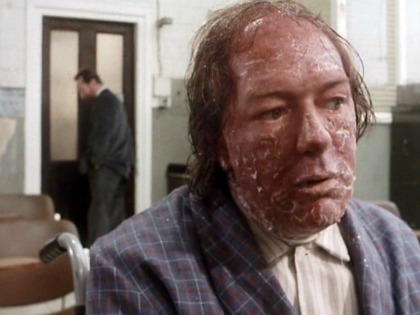
Kennedy Martin’s article was accompanied by an excerpt from his and John McGrath’s script for the 1964 BBC six-parter Diary of a Young Man, three episodes of which were directed by Ken Loach, that used the television equivalent of disruptive Brechtian strategies – stills, a weirdly accented voiceover narration – intended to discourage the audience from a sensory response to drama and to foster political consciousness: to make viewers think, not simply feel. It was not the first non-naturalistic drama.
In 1961, James MacTaggart produced Jack Gerson’s Three Ring Circus, which used long takes, montages, hallucinatory sequences and sound effects in telling the story of an amnesiac adrift in a European police state. MacTaggart also produced the Kennedy Martin anthology series Storyboard (1961), Studio 4 (1964) and Teletale (1964), which featured Loach’s debut, ‘Catherine’. These works variously used narration, multiple scenes, montages, direct address, self-conscious acknowledgment of the studio settings and cutting to music.
MacTaggart produced Potter’s first four ‘Wednesday Plays’ and directed Moonlight on Highway, the writer’s first stab at depicting the psychological result of childhood sexual abuse and thus, along with Emergency – Ward 9, Casanova and the novel Hide and Seek, one of the key works that ‘fed’ The Singing Detective. From the very beginning, Potter used non-naturalistic techniques. His first play, The Confidence Course, and his fourth, Vote Vote Vote for Nigel Barton, feature cynical narrators who augur the singing detective. Stand Up Nigel Barton used direct address, as would The Singing Detective, and innovated the device, used more famously in Blue Remembered Hills, of adult actors playing children.
Paper Roses utilised tabloid headlines and a fake television critic watching the play and, in a coda, phoning in a hurriedly written review. The Singing Detective’s double-casting of actors (in Malahide’s case triple-casting) was preceded by Double Dare’s casting of Kika Markham as actress (angel) and whore; Norman Rossington played two characters in Casanova. Equally disruptive was the return-of-the-repressed device Potter used in Angels Are So Few, Only Make Believe, Schmoedipus, Brimstone and Treacle and Rain in the Roof, whereby young male strangers liberate with sex or violence the stagnant domestic lives into which they are invited by the people who dream them up.
In Follow the Yellow Brick Road, a polemical play about television’s pandering to base appetites and false Edens, Potter showed how a tormented actor rightly believes that he is being manipulated by a television play. The question of whether authors create their characters or characters their authors – whether people are the product of the ‘out-there’, or control their own destinies – was the subject of Hide and Seek and, indeed, The Singing Detective, in which, at the climax, Marlow unconsciously employs the detective to kill off his sick self.
Potter tackled racism in Emergency – Ward 9 (prefiguring the ‘Ali’ scenes in The Singing Detective), tackled party politics in Vote Vote Vote for Nigel Barton, and the Cambridge Spies in Traitor and Blade on a Feather, but was not, primarily, a political writer and thus not really a Brechtian, despite his belief in television drama’s capacity for inspiring make people to effect change in their lives. In the words of John Cook, author of Dennis Potter: A Life on Screen, “Potter’s terrain was instead an intimate ‘interior drama’ – his TV ‘non-naturalism’ an attempt to get under the skin of all viewers, Right or Left, in an attempt to draw their attention to their own individual agency or sovereignty.”
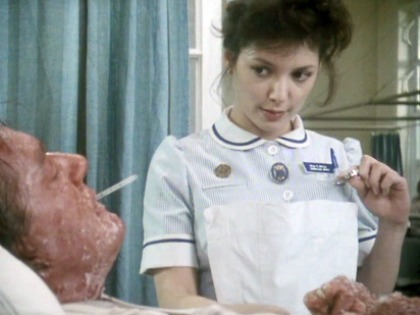
Non-naturalistic experimentation in television drama petered out as the move to all-film productions accelerated in the 80s: the pioneering ‘Wednesday Play’ ended in 1970, its successor, ‘Play for Today’, in 1984. They were replaced by ‘Screen One’ and ‘Screen Two’, the BBC’s response to Channel 4’s ‘Film on Four’. Directors, not writers, became the decisive contributors.
Distinct from television films that were expected to enjoy theatrical runs prior to broadcast, television plays morphed into drama serials and series. The Singing Detective arrived in the middle of a decade dominated by naturalism – Brideshead Revisited, Jewel in the Crown, A Kind of Loving, The Beiderbecke Affair, Fortunes of War, Boys From the Blackstuff, The Monocled Mutineer. But non-naturalism lingered as a tendency. Kennedy Martin’s great eco-thriller Edge of Darkness broke the naturalistic mode by using stock footage and real-life news figures, and it was drenched in myth and mysticism. Howard Brenton’s antiestablishment conspiracy thriller Dead Head echoed The Singing Detective in its studied noirishness.
Unable at first, if at all, to gather the shreds of their sovereignty, Potter’s spiritually bereft protagonists in Stand Up, Nigel Barton, Moonlight, Casanova, Late Call, Schmoedipus and Cream in My Coffee, like Marlow, are blocked by their damaging experiences. Moonlight’s David, the victim of a paedophile, has grown into a misfit who sublimates his anguish in his passion for the 30s singer Al Bowlly, whose songs connote Lost Eden. Potter is sceptical of psychiatry here, but David purges himself of his long-borne sexual disgust by publicly confessing to having slept with 136 prostitutes.
In contrast, Potter champions psychotherapy in The Singing Detective. Marlow, expelled from Eden because he witnessing his mother’s adultery, learns from Gibbon why he has vilified sex and slowly makes peace with himself. Introduced only in the second episode, the therapeutic process, which becomes the story’s spine, involves not only Marlow’s confessions but also his dodges and slips; the Freudian investigation amounts to an almost religious purification.
Philip’s descending the tree to watch his mother have sex with Raymond at the serial’s midpoint represents the Fall. There are several references to Eve’s tempting of Adam. “Let’s see the pips!” Raymond says to Mrs. Marlow in the forest. “Lay off them love apples,” the hospital porter warns Marlow. Potter’s invoking of Original Sin shows how traumatic sexual knowledge leads to repression and conditions like impotence and frigidity and behaviours like sexual excess, which recur in his work.
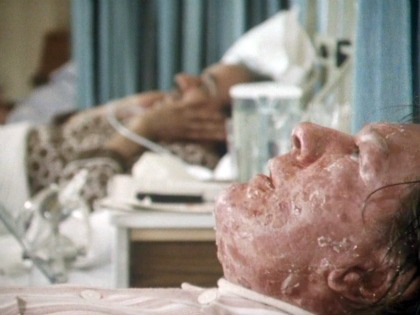
Potter further demonstrates through Gibbon’s analysis how a male who does not resolve the Oedipus Complex is doomed to re-create his mother, necessarily unavailable, in his choices of female partners and to repeat obsessively masochistic or sadistic sexual fantasies. Philip’s castration fears during the phallic stage would have been reawakened when he saw her lying beneath the virile Raymond.
When in hospital he first reimagines his mother’s adultery, he transposes Nicola into his mother’s role, and she mockingly calls for "Philip" (that is, Marlow in his cuckold fantasy) to join them. Mrs. Marlow’s transgression has led Marlow to revile all unfaithful women as “slags” and “sluts”, a recognition that misogyny originates in the immature male’s Oedipal desire for his mother, whom he reinvents as a whore because she belongs sexually to his father. Double Dare’s sick writer, who interrogates an actress about how far she will go in terms of sexual display and eventually murders her, was a prototype for Marlow, but The Singing Detective’s psychoanalytic approach to misogyny was more trenchant than the depiction of it in that erotomaniacal play and the self-implicating Blackeyes.
Extraordinarily moving, as well as bitingly funny in the interactions of patients, nurses, and doctors, The Singing Detective was the climax of Potter’s career, the summation of his key themes and use of non-naturalism and of his complex autobiographical investment in his oeuvre. He would not touch its heights again in the eight years left to him, prolific though he remained. (The 2003 American film version was a travesty.) It is unequalled in the entire spectrum of British television drama, and there may be no greater depiction of psychoanalysis in any film.
Correction (21 November 2011): This feature originally credited the serial Blackpool to a ‘Michael’ Bowker. The correct name is Peter.
Dennis Potter’s 1966 television play ‘Thirty Minute Theatre: Emergency Ward 9’ is one of the unconfirmed highlights of the BFI’s 2011 Missing Believed Wiped screening showcase at the BFI Southbank on 11 December
See also
That was then, this is now: Mark Duguid wonders if we've overlooked a new golden age of television writers (June 2010)
A conviction in comedy: Gary Mills remembers Leonard Rossiter (September 2010)
Blues in the night: David Jays on Pennies from Heaven (September 2000)
